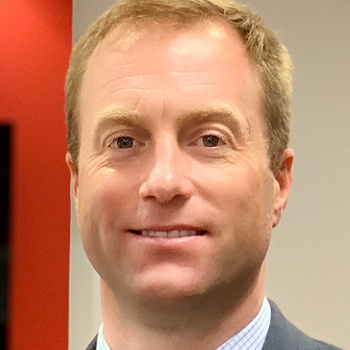Sarson Funds, Inc.
Thanks to a clearing regulatory picture and continued mainstream adoption, there are now several ways for advisors to work with cryptocurrencies on behalf of their clients—but the best may be holding digital assets in professionally managed cryptocurrency accounts, especially given the sector’s well known volatility.

This is a step forward in the conversation about cryptocurrencies, said John Sarson, CEO and co-founder of Sarson Funds, a cryptocurrency asset manager and educational service for financial advisors, as major institutions are now giving endorsements for cryptocurrency investing.
“Wells Fargo released a report in January that said that digital assets are like the internet all over again, there’s the same adoption curve,” said Sarson. “But then they consider how we should recommend investing in cryptocurrencies, and they found only three good ways for advisors to do this.”
The first way is to have clients buy cryptocurrencies on their own and then use professional advice to validate any moves they make. The second is to invest via an ETF or a grantor trust. The third, which was Wells Fargo’s preferred method, was to entrust digital assets to a professional manager in an active strategy.
Wells Fargo made some crypto enthusiasts’ skin crawl with its recommendation, said Sarson, because the libertarian bent that has dominated digital asset discourse over the past decade holds that cryptocurrencies should be invested in and held directly, with “not your keys, not your coins” being their lead mantra.
“There’s a fear that if you don’t hold the keys personally, you might not be able to access your coins, but I don’t think those fears are based in reality,” said Sarson. “Do these same people request their share certificates from Merrill Lynch? I don’t think so. Their stocks are much safer with Merrill. It’s the same way with private keys. Yes, you have the ability to take your coins off of Coinbase or whatever exchange you’re using, but why would you? It just increases your chances of losing them.”
But distrust of traditional custody and money management solutions are prevalent, and not without reason. Many of the more libertarian cryptocurrency enthusiasts point to moves by the Canadian government to freeze-or seize—assets associated with the “Freedom Convoy” anti-Covid-19-mandate protests as an example of why it is more desirable to hold coins directly in secure storage.
“In the U.S., I really don’t see there being a big seizure event of people’s tokens being taken away off of an exchange, so I’m a big fan of just leaving coins on the exchange,” said Sarson. “For similar reasons, I’m a big fan of using professional money managers because this is such a new and quickly moving space.”
Sarson Funds itself has nine people focusing solely on cryptocurrency investing all day, every day—and still finds the space challenging to keep up with.
A lay person investing based on articles they read may be too easily misled to find success in digital assets, said Sarson.
“There’s no guarantee that the articles they’re reading and the information they are leading is going to end up being true,” he said. “There’s no policing of the information that is getting into the market, everyone has to have a buyer-beware mentality, and a lot of retail investors don’t have that eyes-wide-open skepticism.”
While most securities markets forbid trading on inside information, no such rules govern cryptocurrency markets—so most retail investors operate at a significant information deficit to the greater market.
Retail investors also often fail to rebalance, said Sarson.
“Active managers in all asset classes are passionate about portfolio construction,” he said. “If they like something, they might invest 2% of their assets in it. If they love it, they’ll give it a 4% weighting. If it grows to 8%, they’ll cut it back. You don’t see that from people managing their own accounts. We use portfolio construction processes that have been established as being best practices across asset classes, but retail investors are more likely to find one or two names they really like and go all-in, or as we say in cryptocurrencies, ‘ape-in.’”
Rather than going it alone, or through small online investing communities, Sarson believes it’s safer to invest with a professional.
Most cryptocurrency exchanges don’t offer the kind of customer support that can reverse or avoid mistakes.
“If you mess up, there’s no one who can help you,” said Sarson. “If you mess up big and forget how to get to the wallet, or you can’t remember the names of all the sites you staked your coins on, or if you can’t get the wallet to open on your computer, there’s very little support, it’s almost non-existent. Unless you are a very technical person, you probably shouldn’t be doing something so riddled with technical dangers.”
Even those who want to buy and hold a well-established, mainstreamed token like bitcoin might want to take pause, said Sarson.
“It looks like an obvious buy, but technology is full of examples like leadership switches from one technology to the next,” said Sarson. “One leader emerges at the expense of another, and investors are left holding the bag.”
That also makes passive investing a greater risk in a maturing, volatile asset class like cryptocurrency.
Yet most digital asset mutual funds, ETFs and private-placement vehicles are currently passively managed, said Sarson, and grantor trusts are required to be passive.
“When a marketplace is young, with little investor protection in place, you need active management,” said Sarson. “The torrent of development is evolving this space faster than Wall Street can move towards it. Wall Street is just now emphasizing single-coin products, but the market has move from bitcoin to ether to NFTs, and now NFTs have gone through three iterations in a matter of nine months or so.”
Cryptocurrencies also trade 24 hours a day, seven days a week, 365 days a year—and few retail investors or asset managers are built to manage the never-sleep reality of digital assets.
Sarson notes that cryptocurrency prices move on news stories coming from the other side of the world, in different time zones—in fact, the majority of crypto traders aren’t in U.S. time zones, but reside in places like Singapore, South Korea and Eastern Europe.
“Professional management will do a better job avoiding the most dangerous outcomes, like scams, and they will do a better job of avoiding the user errors that end up in total loss, like sending crypto to the wrong address,” he said. “We have systems to prevent that, we haven’t lost a crypto trade in five years—but you hear horror stories all the time. Professional management helps identify scams and reduce errors in investment practices.
“As a financial advisor, if you’re dealing with a volatile asset class and clients have losses, you’d better be able to substantiate the fact that you have the expertise required to understand the risks,” said Sarson. “I don’t think many financial advisors necessarily want to be a portfolio manager, or currently have the ability to adequately defend themselves if they should have to argue whether they have enough knowledge in this space to be better than a professional option. This is not public equities—they might end up losing a lot of arbitration cases if they try to do this themselves.”







